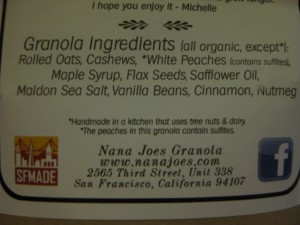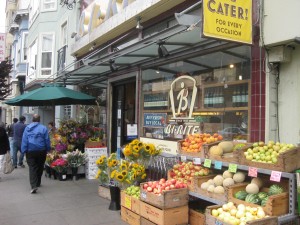 Smug Scout recently visited San Francisco, the Smug Epicenter of the U.S., which presents the problem (not really) of Smugness overload, but a precious little guidebook called Knopf “MapGuide” helped her find the epicenter within the epicenter, a market and “creamery” called Bi-Rite, with these key words:
Smug Scout recently visited San Francisco, the Smug Epicenter of the U.S., which presents the problem (not really) of Smugness overload, but a precious little guidebook called Knopf “MapGuide” helped her find the epicenter within the epicenter, a market and “creamery” called Bi-Rite, with these key words:
- hip deli
- organic vegetables
- Straus family creamery
- salted caramel
Smug Scout started at the Creamery,which is just a Smug name for an ice cream shop and has nothing to do with actual cream processing (which always takes place in a lower rent rural location, not in a Smug neighborhood like Mission Dolores). She was suspicious when she read that many consider the ice cream “the best in the world,” and while she was positive that was a wild exaggeration that had more to do with “creamery,” hip flavors, and high-rent location, she nonetheless wanted to see what the hype was about and especially if it would “taste like the stuff we grew up with” (Bi-Rite’s earnest pledge). Huh? When Smug Scout thinks back on herself in miniature form, she remembers chocolate ice cream dripping through a cone onto her white t-shirt, not bankrupting her parents to eat double ginger, cardamom, or anything with exotic sea salt.
Anyway, when she and her Smug compatriot, a classic SF resident, arrived, she first wondered if it was also a trendy nightclub because there was a velvet rope that cordoned off a whole section of the sidewalk and even went around the corner. But no, that was the overflow Creamery line. Perhaps because the weather was “cold” (low 60s, just freezing), Smug Scout and compatriot could walk right in. That is good, because Smug Scout does not wait on long lines. She thinks long lines are for far more egregious suckers than even she is.
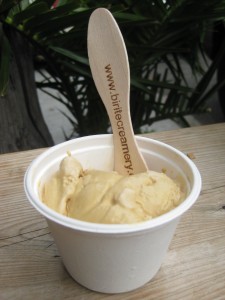
So of course she ordered salted caramel because that is the current ultra-Smug flavor of choice everywhere. After paying something on the far borderline of reasonable, like $5 for one scoop, she received her ice cream in a biodegradable cardboard bowl with a branded wood chip for a spoon. Then she sat down to eat it on some petite, narrow reclaimed wood bench outside. It was good, but she did not like how the sustainable wood chip “spoon” kept sticking to her tongue. It made the flavor more like salted caramel splinter.
Moving on to the store, Smug Scout was very pleased to see produce and flowers in wood crates right in front of the door just like a roadside farm stand. Here is how she knew she found the epicenter within the epicenter:
- The aisles are so narrow that anyone who enters in a wheelchair, in a state of morbid obesity, or pushing a car-sized European baby carriage will need the jaws of life to get back out. Despite the obvious fact that the revenue from this breathtakingly expensive store could permit expansion, the crowded, cramped conditions convey exclusivity. Too much space is gauche anyway, like the moneyed lower classes who live in McMansions.
- Local is the law here. The store boasts local coffee “delivered to us by bicycle,” local honey “from our own hives on the roof of the Market,” and a slew of local products bearing the proud stamp “SF Made.” This is very reassuring. Smug Scout wonders if the bees appreciate that their address is more exclusive than that of many of their honey buyers.
- Most signs and advertisements are entirely (or at least partially) handwritten and offer a lot of friendly detail. The faux folksy charm of this practice is intended to distract from the prices, Smug Scout thinks. Your sticker shock will be less paralyzing as you think of the Smug local people who have crafted these signs to help you.
- You get a tremendous amount of information about the produce: what its exact name is, where it was grown, how it was grown, and probably even why it was grown. This store even has its own “family farm” in Sonoma. Stickers on the handwritten signs proclaim “WE GREW THIS.” Sold! Smug Scout admired the summer squash called “Zephyr” and “Costa Romesco” and selected the least attractive ones.
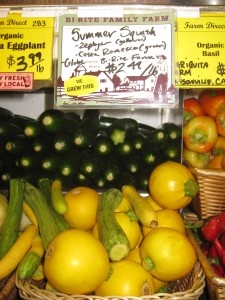
Still, if Smug Scout has one complaint (and let us face it, she always does), it is that the store provides only non-compostable plastic bags, which is very ecologically hostile for a city that does not recycle any plastic bags. She had to point out this fact at the cash register after she whipped out her own cloth bag.
- Smug Cashier: Thank you for bringing your own bag. That’s just great.
- Smug Scout: I always do, but it’s especially important in San Francisco since you don’t recycle plastic bags here.
- Smug Cashier: That’s just great. Enjoy your local goat cheese with organic herbs and artisanal pink peppercorns!
- Smug Scout: Even L.A. recycles all levels of plastic!
- Smug Cashier: Have a wonderful evening! Come back soon!
Oh, yes, Smug Scout will return soon. If she could marry a supermarket, it would be this one.
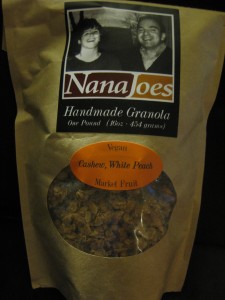 If you must know, Smug Scout loves granola. She eats it every morning she is forced to go to work. She likes it because she can put ingredients (granola, yogurt, and of course local, seasonal, organic fruit) in her German reusable plastic container (yes, made in Germany!) and when she arrives at her desk mix it into a Smug L.A. version of Swiss Bircher Müsli. So she is always looking for appropriately artisanal granola, and when she saw Nana Joes Handmade Granola at the legendary Bi-Rite Market in San Francisco, she had to have it, even though she does not understand the absence of an apostrophe in “Joes.” Let us consider why this granola seemed Smug:
If you must know, Smug Scout loves granola. She eats it every morning she is forced to go to work. She likes it because she can put ingredients (granola, yogurt, and of course local, seasonal, organic fruit) in her German reusable plastic container (yes, made in Germany!) and when she arrives at her desk mix it into a Smug L.A. version of Swiss Bircher Müsli. So she is always looking for appropriately artisanal granola, and when she saw Nana Joes Handmade Granola at the legendary Bi-Rite Market in San Francisco, she had to have it, even though she does not understand the absence of an apostrophe in “Joes.” Let us consider why this granola seemed Smug:
